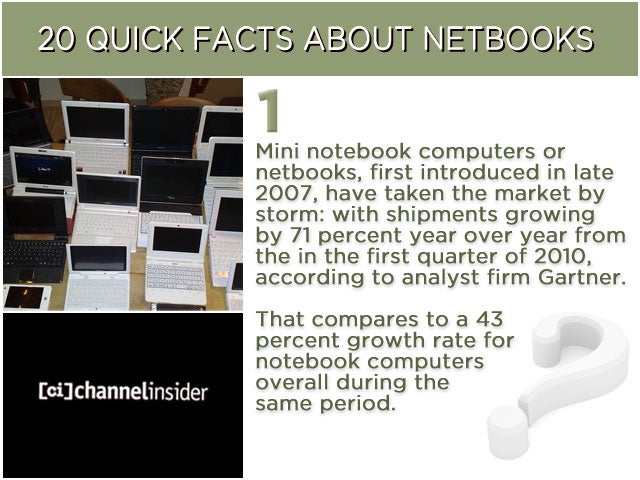 20 Quick Facts about Netbooks
20 Quick Facts about Netbooks
Mini notebook computers or netbooks, first introduced in late 2007, have taken the market by storm: with shipments growing by 71 percent year over year from the in the first quarter of 2010, according to analyst firm Gartner. That compares to a 43 percent growth rate for notebook computers overall during the same period.
 No Title
No Title
The ASUS Eee PC 700, considered the first mass-produced netbook, had a 7-inch screen, ran on the Linux OS and offered a solid state drive.
 No Title
No Title
Portability and price have made netbooks highly popular among consumers and with professionals who spend a lot of time on the road. Refurbished units can be had for as little as $200.
 No Title
No Title
Not cheap enough for you? Carriers such as AT&T, Verizon and Sprint have offered subsidized netbooks for sale, or even for free, to consumers– if they sign up with the 3G data plan.
 No Title
No Title
In spite of their popularity, some industry observers claim that netbooks suffer higher consumer return rates than notebook computers do in general because consumers don’t really understand the difference between the two until they get them home and try them out.
 No Title
No Title
For example, netbooks typically don’t come with optical drives. And if you want to stream video or play games, they won’t work as well as a PC with a powerful graphics card.
 No Title
No Title
But that may be changing. Graphics chip maker Nvidia offers the Nvidia Ion, a graphics processing chip for the netbook that promises 10x better performance and is set to make its debut in the Acer Aspire One 532G netbook. A predecessor chip offered 5x better performance.
 No Title
No Title
Even though Intel only debuted its Atom chip that is behind so many netbooks in 2008, the netbook name was in use long before then.
 No Title
No Title
Psion introduced a rugged device called netBook in 1999 for the mobile enterprise market that went on to sport Windows CE as its operating system.
 No Title
No Title
When Intel introduced its Atom processor in 2008, the chip giant promoted it for use inside extra-small, power-efficient notebook computers that Intel generically called “netbooks.”
 No Title
No Title
In December 2008 Psion sent cease and desist letters to Intel and others, asking them to stop using the term “netbook” to describe the small notebooks that were storming the market.
 No Title
No Title
But Intel and Psion ultimately settled the trademark dispute in June, 2009, and Psion agreed to let other companies use the term “netbook.”
 No Title
No Title
Intel’s Atom chips dominate the netbook market today, even as many techies await more netbooks based on ARM processors.
 No Title
No Title
The iPad runs on an ARM processor, and consumer electronics site Retrevo recently revealed survey results that showed iPad may be cutting into netbook market share, with 22 percent of potential buyers saying they were leaning towards a netbook versus 78 percent who were leaning towards an iPad.
 No Title
No Title
In spite of being featured heavily on early netbooks, Linux has been overshadowed by the more familiar Windows operating system on netbooks.
 No Title
No Title
Microsoft is pushing Windows 7 as the new operating system for netbooks. The software giant recently told OEMs and partners that October 22, 2010 will be the last day they will be able to preinstall Windows XP Home on new netbooks.
 No Title
No Title
Other potential operating systems for netbooks include Android and Google’s upcoming Chrome OS.
 No Title
No Title
Intel put a licensing limit on netbooks that used its Atom N series chip – saying the processor could not be used for netbooks with screen sizes bigger than 10.2 inches. Some observers think the move was designed to prevent cannibalization of notebooks by growing netbook market share.
 No Title
No Title
Big vendor names in netbooks include Asus, Acer, Archos, HP, Dell, Lenovo, Toshiba and VIA.
 No Title
No Title
Manufacturers have also introduced special edition and designer netbooks, including the Vivienne Tam netbook from HP and the Limited Edition Dell Design Netbook by Deanne Cheuk – generally available for a premium price over a plain netbook with similar specs.

